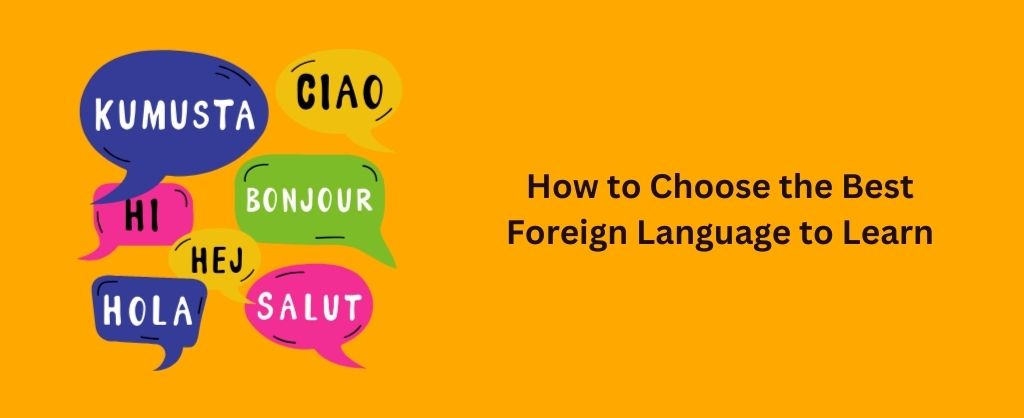How to Choose the Best Foreign Language to Learn

With over 7,000 languages spoken around the world, there are plenty of options to choose from. However, selecting the right language to learn can seem daunting.
Content
- Examine Your Motivations
- Assess the General Difficulty Level
- Determine Usefulness
- Review Available Learning Resources
- Connect With Your Interests
- Making the Final Decision
- Frequently Asked Questions
There are many factors to consider when deciding which language is best for your goals and interests. Here is an overview of the key considerations when choosing a language to learn:
Examine Your Motivations
Reflect deeply on the core motivations behind your desire to learn a new language. Your reasons will guide you towards languages that are well-suited for your needs.
Enhance Career Prospects
If you want to learn a language to improve job opportunities, consider languages that are in high demand. For business, some top options are English, Mandarin Chinese, Spanish, Arabic and German.
Research job postings and talk to colleagues about what would make you a stronger candidate.
Connect With Family or Heritage
If you want to connect with family members or learn more about your cultural heritage, choose their native language. Learning the language will help you communicate with relatives and immerse yourself in the traditions.
Prepare for Travel
If you are planning a trip to a specific country or region, learn the local language. You will be able to navigate, interact with locals and appreciate the culture on a deeper level.
Some top languages for travelers are Spanish, French, Italian, Japanese, Arabic and Portuguese.
Pursue an Interest or Hobby
Consider learning languages related to your personal interests or hobbies. For example, if you love film, look at taking French, Spanish or Hindi classes.
If you enjoy reading ancient philosophy, try picking up Latin or Ancient Greek. Matching a language to a passion makes learning it more interesting and enjoyable.
Assess the General Difficulty Level
The general difficulty level of a language can impact how long it takes to gain fluency. On average, romantic languages like Spanish, French and Italian are easier for English speakers to pick up compared to languages like Mandarin Chinese or Arabic. However, every language has its own unique complexity.
Easier languages typically share the following characteristics:
- Use the same Latin alphabet as English
- Contain many cognates, or words that sound similar and have the same meaning in both languages
- Have simpler grammar rules and sentence structures
- Have consistent pronunciation and spelling patterns
Harder languages often have:
- A completely different writing system and script, like Chinese characters or Arabic script
- Very few similarities or cognates with English vocabulary
- Complex grammar systems, difficult pronunciation or tonal elements
- Highly idiomatic phrases and expressions that cannot be directly translated
Consider your own language learning abilities and time commitments when weighing difficulty level in your decision.
Category I: Easiest: Spanish, Italian, Portuguese, French, Romanian, Swedish, Norwegian, Dutch
Category II: Medium Difficulty: German, Greek, Russian, Hindi, Farsi, Hebrew, Polish, Thai, Vietnamese
Category III: Very Difficult: Arabic, Chinese, Japanese, Korean
However, difficulty should not be the only determining factor. Even very difficult languages are attainable with consistent practice over time.
Determine Usefulness
Prioritize languages that are both widely used in the world and align with your professional, social, academic or travel goals. For example, English and Mandarin Chinese have very high global usefulness. Even gaining basic proficiency can smooth communication and open new doors.
However, specialized cultural knowledge is also valuable. Learning an important regional language may benefit your work or research even if the total number of speakers worldwide is relatively small.
Here are some of the most widely used languages:
- English – Spoken globally in business, academia, technology, tourism and more. Useful for international travel and careers.
- Spanish – With 470 million native speakers, it is the second most spoken language. Useful for communicating in North/South America and Spain.
- Mandarin Chinese – Spoken by over 1 billion people in China and Asia. Increasingly important for global business.
- Hindi – One of the official languages of India, with 600 million speakers. Useful for communicating in India or with the Indian diaspora.
- Arabic – The primary language of the Middle East and North Africa. Useful for careers related to that region.
- French – Spoken in France and widely used in Africa, Canada and the Caribbean. Important for diplomacy, arts and academics.
- German – The native language of Germany, Austria and Switzerland. The most spoken native language within the EU.
Prioritize languages that align with your goals and regions you will interact with. Even learning the basics of a very useful language can make a big difference.
Review Available Learning Resources
When choosing a language, research what learning resources and support are available to you.
Diverse, high-quality resources will provide well-rounded practice and stronger skills development. Thoroughly research materials for any language you are considering.
Resources may include:
- Classes – In-person or online classes with a teacher and curriculum. Great for conversation practice and direct feedback.
- Tutors – One-on-one online or in-person tutoring sessions tailored to your needs. Provide individual support.
- Apps and audio – Language learning apps like Duolingo or Babbel that use spaced repetition. Audio resources help build listening skills.
- Books and workbooks – Textbooks, phrasebooks and grammar workbooks for structured practice.
- Immersion opportunities – Immersion environments like language camps or study abroad programs provide intensive practice.
- Media – TV shows, movies, music, newspapers and podcasts in your target language. Great for passive listening.
- Online communities – Forums and social media groups to exchange ideas. Allow you to interact with native speakers.
Ensure there are enough quality resources available for the language you select. Having diverse materials will make the language easier and more enjoyable to learn.
Connect With Your Interests
Most importantly, choose a language that genuinely interests you on a personal level. Maintaining motivation when learning a language can be challenging.
If you have a pre-existing interest or connection to the culture, history or sounds of a language, that can sustain your motivation long-term.
Follow your enthusiasm – it will make learning more rewarding and enjoyable long-term.
Languages you may feel intrinsically drawn to learn include those that:
- You have family connections to
- Are spoken in a place you dream of traveling to
- You enjoy the sound and pronunciation of
- Play a role in a culture you are fascinated by
- Are associated with a skill you want, like playing foreign music
- Connect to your heritage or ethnic background
Follow your passion. It will make the learning process more fun and inspire you to keep going, even during difficult parts of the journey.
Summary of Key Considerations
- Motivation – Career benefits? Connect with family? Prepare for travel? Pursue a hobby?
- Difficulty Level – How much of a challenge do you want?
- Usefulness – How applicable will this language be for achieving your goals?
- Available Resources – What types of quality learning materials can you access?
- Personal Interest – Do you have a genuine passion for the culture related to the language?
By weighing each of these key factors, you can determine which language is the best match for your situation and interests.
Making the Final Decision
Once you have assessed the above considerations, it is time to make your language selection. Here are some final tips:
Don’t Overthink It
There are so many languages to choose from it can seem overwhelming. Try not to overanalyze – go with your gut instinct as to which language excites you the most. Perfection is not necessary at this stage.
Set Priorities
Rank the key factors by importance to you. For example, you may value usefulness and career benefits over difficulty level or available resources. Use your priority order to guide your decision.
Remember It’s Not Permanent
Choosing a language to learn now does not have to be a lifelong commitment. You can always add a new language later. Consider it a starting point that can open new doors over time.
Mix It Up
You do not have to restrict yourself to just one language. It is possible to learn multiple languages simultaneously or pick up another one after reaching an intermediate level in your first choice. Variety can keep language learning exciting.
Consult Others
Get advice from language teachers, tutors or polyglots to see if your selected language seems like a good fit based on your goals and learning style. Friends who are native speakers can also provide input.
Stay Flexible
Your interests, travel plans and career path will likely evolve over time. Try to choose a language that will be useful to you in the long-term, but stay flexible. You can always adjust course down the road.
Evaluating your motivation, difficulty, usefulness, resources and personal passion will lead you to a great starting language. Stay open-minded, get advice when needed and remember you can learn multiple languages over your lifetime.
With a clear sense of priorities and an enthusiasm for the culture tied to the language, you will be poised for language learning success and enjoyment!
Frequently Asked Questions About Choosing a Language
What if I want to learn a very rare or obscure language?
Learning a minority language or endangered language with few global speakers can be very rewarding. Be prepared that resources like tutors, classes and media may be hard to find. Connecting directly with native speakers who want to pass on their linguistic heritage will be key. Set realistic goals for proficiency level, and focus on the cultural enrichment.
Should I let language difficulty stop me from choosing one I’m interested in?
Not necessarily. Any language can be learned with consistent, long-term effort. However, very difficult languages generally take years longer reach proficiency compared to easier Romance languages. Consider if you are ready to commit to the extended timeline and rigorous study required.
Can someone be fluent in more than 3 languages?
Yes, it is certainly possible for someone to achieve fluency in multiple languages with enough time and practice. Individual language aptitude varies greatly. Some accomplished polyglots have mastered 10 or more languages. But for most people, fluency in 1 or 2 foreign languages is a more realistic goal along with conversational skills in others.
Should my first foreign language be the same as what I studied in school?
Not always – the language you studied briefly in a class may or may not be the best choice for deeper study depending on your goals. Assess your languages studies along with other key factors. If you developed a strong interest in that language, it may still be a good option. But it’s also fine to try something completely new.
Is it better to focus on language usefulness or personal interest?
There is no one right approach – it depends on your priorities. Usefulness is critical if you want language skills for career advancement. But studying a highly useful language you have zero interest in can be very unmotivating. Try to balance usefulness with some degree of personal connection to sustain your engagement.
How long should I study before switching to a new language?
There are no hard rules, but at least 6-12 months of consistent practice with one language is recommended before adding another. This allows enough time to fully train your ear, build a core vocabulary and grasp basic grammar concepts. Jumping between new languages too quickly can hinder overall progress.
Can apps fully replace traditional classroom language learning?
Apps provide helpful supplemental practice, but most experts recommend blended learning. Classroom instruction with a teacher enables you to properly learn grammar, writing, speaking skills and culturally appropriate communication. Apps are limited in providing full feedback. Balance app practice with interactive lessons.
Should I learn the language of my heritage or ancestry?
Learning your family’s language of origin can be deeply meaningful and a way to connect with your roots. If family members still speak the language, they can be great resources in your learning process. Share your progress with relatives and ask them to speak with you. Diving into your linguistic heritage allows you to honor your background while gaining a useful skill.













